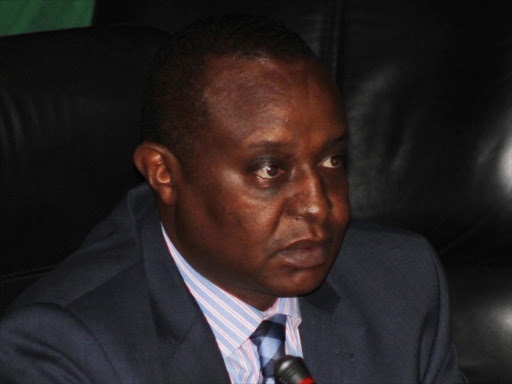A court file containing documents challenging the prosecution of former Treasury CS Henry Rotich in the Kimawrer and Arror dams case has gone missing.
The case had been listed for a mention on Monday before Judge Anthony Mrima but failed to proceed because the file could not be traced.
The matter had to be placed aside for the file to be located. But by noon when the court resumed, it had yet to be located.
Justice Mrima said directions will be issued to the parties in the case by the Deputy Registrar once the file is found.
The last time the matter was in court the Director of Public Prosecutions Noordin Haji sought to have Rotich’s matter transmitted to the Chief Justice to impanel a bench of uneven judges to hear it.
The application by the DPP came after Rotich accused Haji of applying selective prosecution.
Rotich, in his petition, claimed that the DPP charged him and left out key players in the deal, including former Attorney General Githu Muigai and former Solicitor General Njee Muturi.
He also demanded the prosecution of former Environment and Regional Development CS Judi Wakhungu and experts from the ministry, saying they provided necessary opinions before writing to the Treasury to seek funding for the two dams.
Haji, in his fresh application, has invited the bench—once formed—to determine a number of issues, including whether Cabinet secretaries are immune to criminal prosecution in respect of any acts and omissions punishable by law occasioned in the course of duty. The application has been filed before Anti-Corruption High Court judge James Wakiaga.
The DPP also wants the bench to decide whether a decision to prosecute a CS can be faulted on account of the pronouncement by politicians that have no connection to the subject matter of the criminal proceedings and the evidence available to him.
According to court documents, the questions raised by the DPP have yet to be determined and failure by the High Court to pronounce itself with finality on such issues could easily cripple criminal proceedings in all subordinate courts.
The DPP says the questions they want to be determined are not only of great importance to them but also to the public in the war on corruption.
“It is for this reason that we implore the court to certify the matter for impanelment as it is in the best interest of the public that these questions are conclusively determined to enable the efficient and expeditious prosecution of criminal cases,” he says.
Also sought is whether the courts can review his decision to charge even after having observed procedural propriety and applied its mind to constitutional requirements regarding the decision to charge and whether courts may interfere with the decision to charge in the absence of any evidence or establishment of any procedural impropriety.
“We also want the court to determine whether in the exercise of powers conferred upon me under Article 157 of the Constitution, criminal proceedings can be initiated against a CS as the one concerned with the overall functions of the ministry and whether he is accountable individually for the exercise of his powers and performance of his functions under the law.”
The DPP has acknowledged that the decision of a single judge has the same value as that of an expanded bench but each case is to be considered on its own to promote harmony in decision-making.
There's no story that cannot be told. We cover the stories that others don't want to be told, we bring you all the news you need. If you have tips, exposes or any story you need to be told bluntly and all queries write to us [email protected] also find us on Telegram

